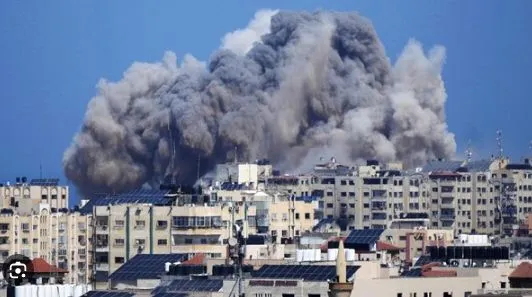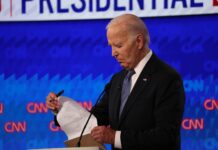Huge test for CCP regime’s global power and turn to ‘Global South’
Editorial from Socialist magazine (ISA in China) issue 72
The war that erupted in the Middle East on 7 October is convulsing world relations. This adds a new layer of complications for Xi Jinping’s regime, which is locked in an imperialist Cold War with the US and at the same time confronts an unprecedented economic crisis at home.
Israel’s new war of subjugation against the Palestinian people, with an imminent ground invasion of Gaza, is both a horrific repeat but also a very different conflict from its earlier wars. This is horror on a new level. Already according to the United Nations, one million Gazan Palestinians have been displaced since the war started. Israeli army leaflets rain from the sky, ordering the 1.2 million population of the northern half of Gaza to evacuate “within 24 hours”. But they have nowhere to go. Roads are destroyed and the border into Egypt is closed. Israel has bombed and reduced to rubble vast areas of Gaza since the war began while 300,000 Israeli reservists have been mobilised for the ground offensive. The death toll of Palestinian civilians including children is skyrocketing.
Like the war in Ukraine, this takes place against the background of the new Cold War, with an intensifying global power struggle between US-led and China-led camps that dominates global processes and insinuates itself into virtually every national and regional crisis and conflict.
US imperialism and the reinvigorated western bloc that emerged after Russia invaded Ukraine last year have of course declared their support for the Israeli regime. This political support was actually much easier to extend because of the massacres carried out by the Hamas military forces when they, in an unprecedentedly bold offensive action, swept over the border from Gaza – “the world’s largest open-air prison” – into southern Israel on 7 October. More Israeli civilian lives (over 1,000) were lost in this attack than at any time since the formation of the Israeli state in 1948.
The Palestinian people’s resistance against the Israeli state’s brutal and intensifying occupation and siege of their land and homes is justified and deserves the support of all socialists. But in the attacks and massacres carried out by Hamas in southern Israel its reactionary character was revealed. Hamas is a conservative islamist movement backed by various right-wing and viciously anti-working class regional dictatorships.
Among the Israeli Jewish population, the shock and fear triggered by the 7 October attack has strengthened the “self-defence” propaganda of the Netanyahu government as it prepares a merciless and unprecedented ground invasion of Gaza. This can only mean ethnic cleansing and the mass expulsion of Palestinians. Many fear a “second nakba” – a reference to the mass displacement of Palestinians after the 1948 war. On this basis the vicious cycle of nationalism and sectarian conflict will continue and accelerate, with right-wing authoritarian forces rising on both sides. Only a working class socialist alternative can break this deadly trend, as the statement by ISA comrades in Israel-Palestine outlines.
Projecting US power
Biden has used this crisis to project US imperialism’s military power, still the world’s undisputed number one, by dispatching first one and then a second aircraft carrier group to the region and warning the Iranian regime not to intervene in the situation directly or through its ‘proxy’ militias such as Hezbollah in Lebanon. Hamas, a Sunni Muslim organization, is not directly under the political control of Shi’ite Iran, but receives most of its arms, funds and training from it.
Western governments have massively stepped up their uncritical pro-Israel propaganda, with a convoy of foreign leaders including Biden set to visit Israel in coming days. At the same time huge demonstrations in solidarity with the Palestinian masses have taken place in cities around the world. In some supposedly democratic countries, such as Germany, these protests have been denounced as supporting “terrorism” and even threatened with police prosecution.
The Iranian dictatorship does not sit securely in power. It has been shaken by year-long mass protests following the murder of 22-year-old Mahsa Amini. Seeking to extricate itself from mass pressure at home it is not unthinkable that the Iranian regime could intervene. Iran-backed Hezbollah in Lebanon has been exchanging fire with Israeli forces over the past week and its leaders have their own reasons to fear a shift in the military balance if Israel should succeed in “neutralizing” Hamas in Gaza. The possibility of a wider war drawing in other regional forces becomes greater in the event of a wider bloodbath and humanitarian catastrophe which now looks inevitable arising from Netanyahu’s invasion of Gaza.
Even the Israeli government’s Western backers are now exerting pressure to rein in and limit the scope of its planned ground invasion. President Biden told CBS Television on 15 October, “it would be a mistake for Israel to occupy Gaza again”. US officials have begun to remind the Israeli regime to follow “the laws of war”. US imperialism risks further eroding its position in the Middle East and throughout the ‘Global South’ by being seen as an accomplice of Israeli war crimes in Gaza. It therefore prefers a more targeted ‘surgical’ military operation, which would still undoubtedly be very costly in human terms.
Whether this succeeds in ‘moderating’ the Israeli state’s onslaught remains to be seen. Netanyahu’s regime – with the opposition parties now joining in a ‘unity’ coalition – is under intense pressure with widespread public criticism and debate about the “greatest failure in Israel’s history”. Most governments at the start of a war experience a boost in their poll ratings but this has not happened in Israel. Netanyahu’s boast of rooting out Hamas and destroying it militarily is a desperate attempt to regain some semblance of public trust. Therefore, US imperialism is not ultimately in control of the process. The crisis which we already see in each of the major imperialist powers can be magnified, especially if this war escalates into a wider regional conflagration.
China’s stance
For Xi Jinping’s regime the only positive from this is the hope that Biden and US imperialism will become “distracted” and shift strategic focus back to the Middle East, taking some pressure out of the US-China conflict. Putin clearly has the same hope that western capitalist governments will, at least partially, take their eyes off the war in Ukraine.
But aside from this, all other factors add to Xi’s difficulties. In the immediate term, the US has been able to showcase its power once again as “the world’s police” and the major power in the Middle East. In just a few days events have undermined and to a degree punctured Xi Jinping’s attempts to project himself as a powerbroker and potential mediator in the many crises of the Middle East. In March, when China helped to broker a truce between Iran and Saudi Arabia, this was a significant albeit limited geopolitical coup for Xi.
When Mahmoud Abbas, leader of the Palestinian Authority (and rival government to Hamas), made a state visit to China in June 2023, relations were raised to the level of “comprehensive strategic partner”. This kind of diplomacy aimed at the Arab world is driven mainly by economic imperatives, but also helps to buy the silence of these regimes (mostly dictatorships) over the CCP regime’s brutal repression of Uighurs and other Muslim ethnic groups in Xinjiang. Xi also reportedly told Abbas that he was willing to act as a mediator in the Israel-Palestine conflict, contributing “Chinese wisdom, Chinese Strength”.
Today this offer sounds rather ludicrous. It may even have been a case of Xi getting carried away following the success – still yet to be seriously tested – of the Iran-Saudi détente. In reality, rather than a ‘major player’, Xi’s regime is largely forced to play the role of bystander to the terrible events now unfolding. Once again, we see how the CCP regime tends to inflate its ‘achievements’ whenever the opportunity arises in order to project an image of strength. While the extension of its influence in the Middle East especially through economic ties is significant, Chinese power is still some distance away from being able to fundamentally challenge or displace US power.
In terms of propaganda, much like its approach to the Ukraine war, the CCP is mostly emphasizing the role of US imperialism for “fanning the flames rather than cooling down the situation” (Global Times). This is of course true especially from a long-term historical perspective: US imperialism’s wars, economic exploitation, support for dictators and shielding of Israeli capitalism, have perpetuated and aggravated the multiple volatile crises that exist in the Middle East.
Xi’s regime wishes to present itself as ‘neutral’ and a ‘peacemaker’ also in this conflict. As in Ukraine, this means walking a tightrope as Chinese capitalism’s real interests are exposed as each crisis deepens. The CCP does not offer any alternative to the existing oppressive global order as it also stands for the continuation of capitalism and imperialism (preferably Chinese), for deals with corrupt and autocratic elites, and for maximizing its markets and sources of raw materials at the expense of the masses. Half of China’s oil imports come from the Persian Gulf region. Given China’s domestic crisis, economic Japanification and the bursting of the world’s biggest property bubble, the CCP wants nothing more than to avoid new global threats and instability.
Beijing’s diplomatic tightrope is shown in the fact that China is now Israel’s third largest trading partner with bilateral trade reaching US$23 billion in 2022. By comparison, China’s bilateral trade with Palestine was a miniscule US$158 million. Most importantly, China has invested significantly in Israel’s tech sector and hoped to use ties with Israel to partially offset the Biden government’s microchip blockade against China.
The fight for the ‘Global South’
Beijing is under pressure from Western governments and Israel to denounce Hamas for the 7 October attack, which it has refused to do. This diplomatic silence could exact a high price with the US drawing Israel even more closely into its Cold War camp against China and Russia. But on the other side, the CCP could incur incalculably greater losses in its relations with Arab and Muslim states if it was to shift to a more Israel-friendly tone.
China is the number one trade partner of the Middle East region as a whole, with US$507 billion worth of bilateral trade last year. According to Chinese government data, 21 Arab countries have joined the Belt and Road Initiative. Beijing’s ‘pivot to the Global South’ as a way to counterbalance and blunt US imperialism’s anti-China strategy has emerged as a central feature of Xi’s diplomacy in 2023. This was exemplified by the enlargement of the BRICS group in August, bringing in three Arab states plus Iran and two others. These and other moves to expand Chinese imperialism’s reach in the so-called Global South (Africa, Asia, Middle East and Latin America) will be put to a stern test by the unfolding Gaza war.
At a bare minimum the Third Belt and Road Forum which just opened in Beijing will be completely upstaged by the crisis 7,000 kilometres away. And the CCP’s dilemma, how to keep its balance on a diplomatic tightrope, will become even more challenging if the war spreads, as becomes possible if a new Israeli occupation is established in Gaza.
Following on the horrors of the Ukraine war, the war now unfolding on Israel’s borders is a new shocking reality check about the age we live in. Global capitalism is dragging humanity towards the abyss of endless nationalist strife, militarism and terrible wars. Building a working class socialist alternative in all countries and regions is a matter of the greatest urgency.




